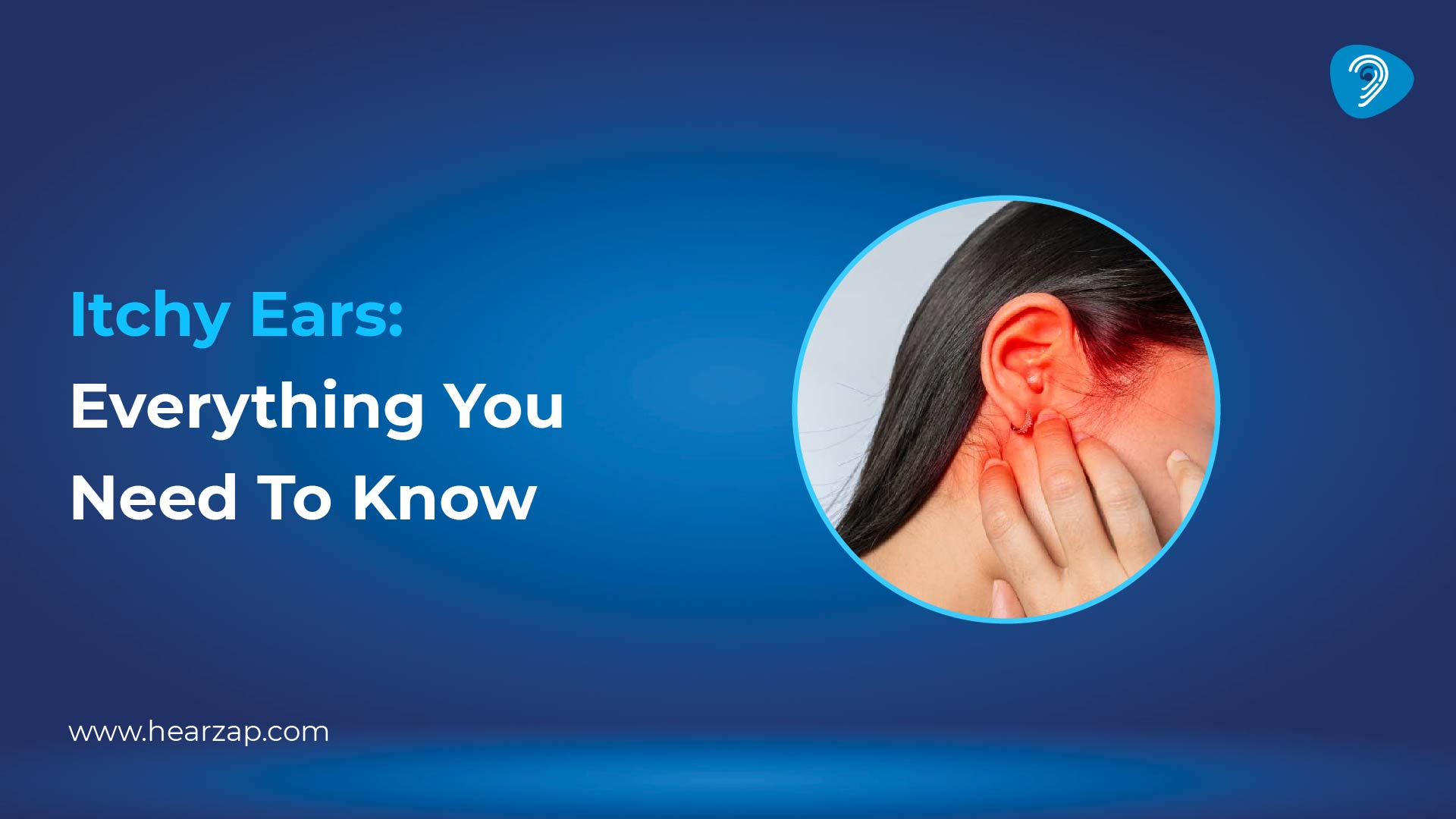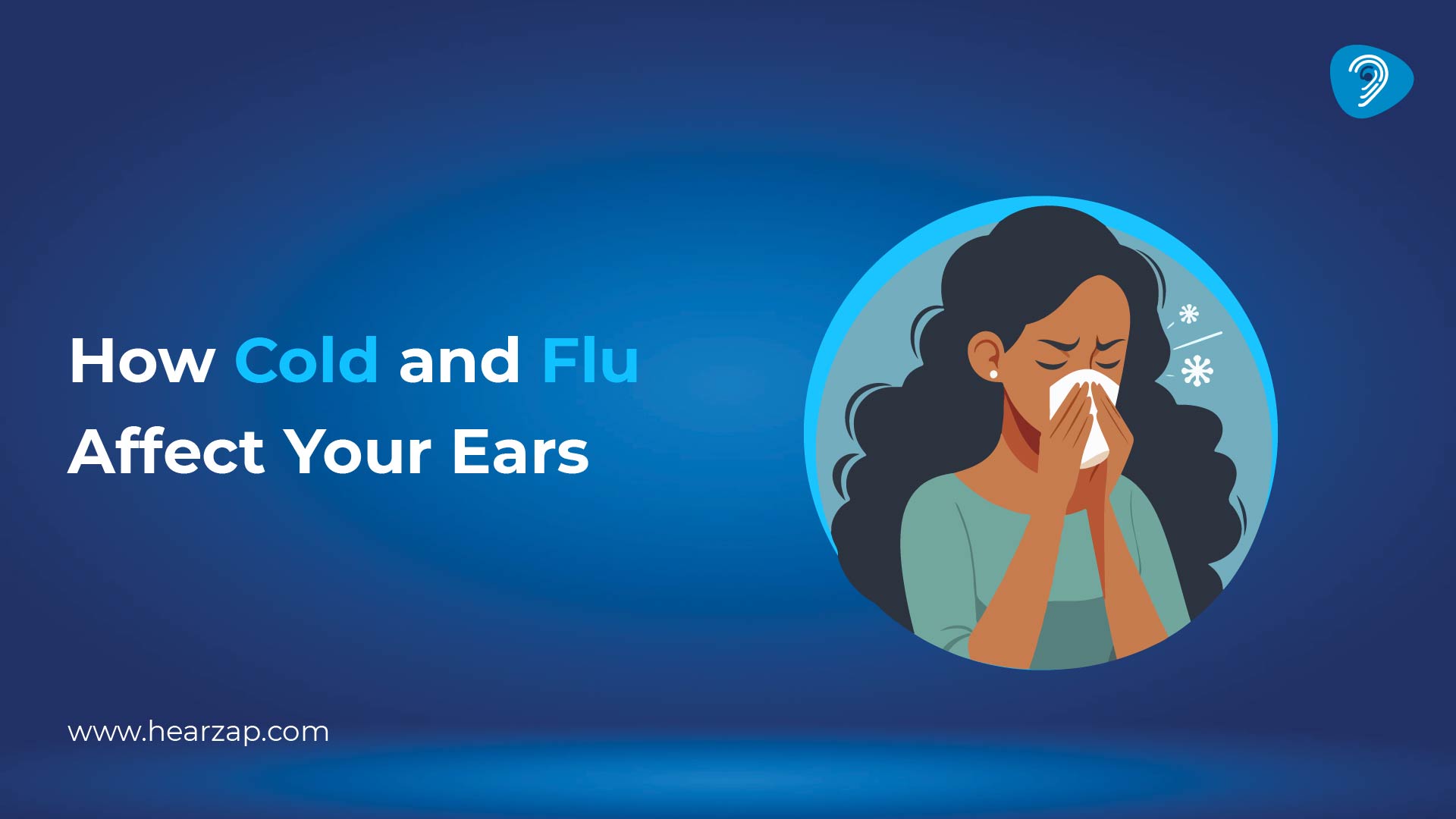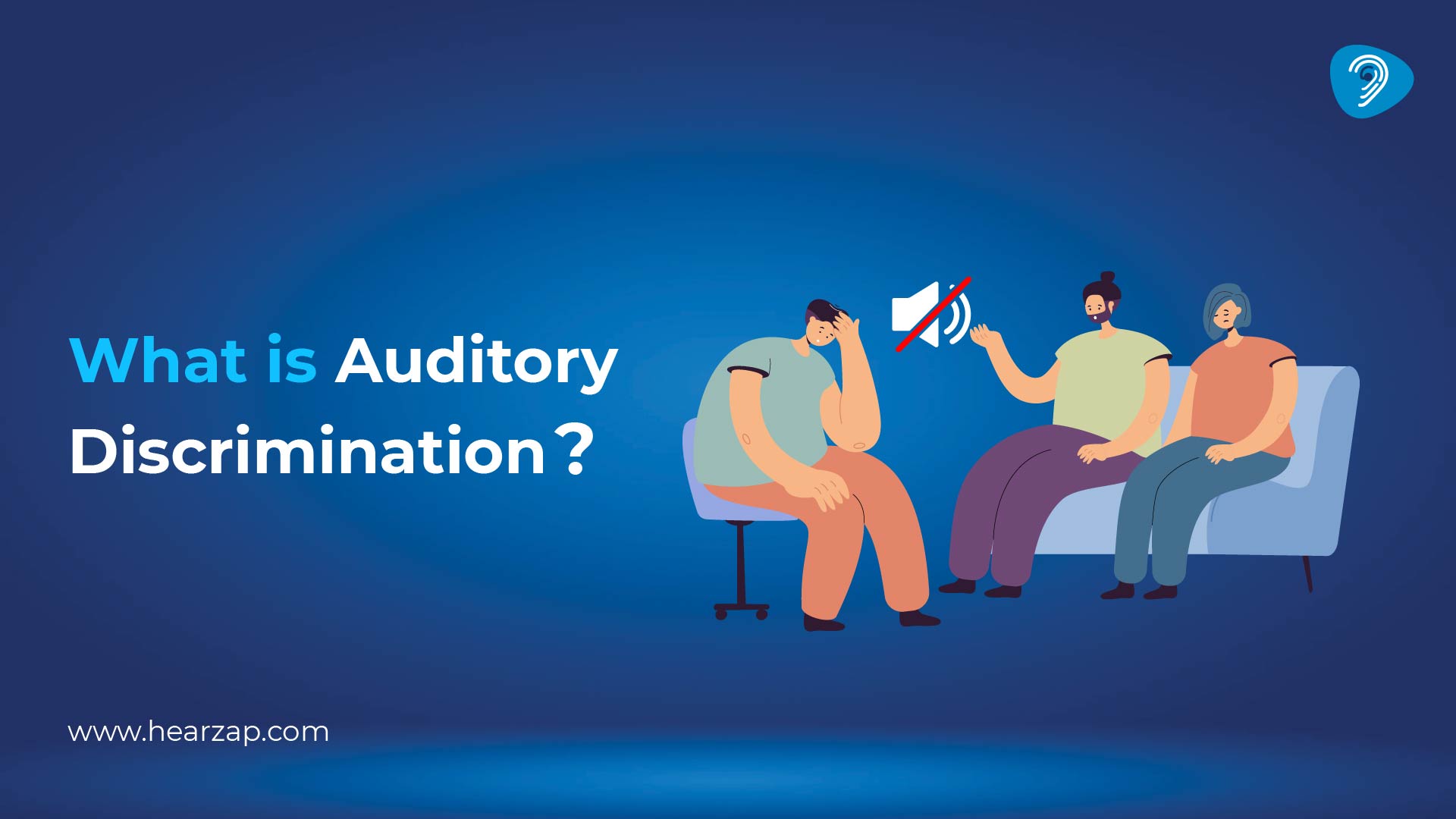Generic
8 Causes of Itchy Ears – Symptoms, Remedies and Treatments
By Team Hearzap | Aug. 5, 2024

Itchy ears are common and usually short-lived, but persistent irritation can throw off your day, disturb sleep, and raise worries about infection. This guide explains the causes of itchy ears, outlines the most typical symptoms of itchy ears, and shares sensible, low-risk care tips people often use to feel better. It’s general information you notice severe pain, discharge, hearing loss, fever, or continuous itching in the ear, consider a clinical check rather than self-treating.
Understanding the Causes of Itchy Ears
Itchy ears rarely come from just one thing. The ear canal is delicate, with hairs and wax that keep it protected. When moisture or skin balance changes, or when everyday habits irritate the area, that tickly feeling can often start. It can be as simple as how we clean our ears or what we wear in them. We will explain the main reasons next. Here are the causes listed below.
Ear Infections
The ear canal or the middle ear can become inflamed from bacterial, viral, or fungal infections. Along with itching, you may feel throbbing pain, pressure or fullness, fever, and sometimes discharge. Your audiologist will conduct an ear examination, confirm the cause, and explain the plan. Care usually includes keeping the ear dry, avoiding swimming, and resting. Treatment matches the cause: antifungal ear drops for fungal infections, and antibiotics only when a bacterial infection is confirmed.
Dry Ears
The natural oils and wax in our ears play a crucial role in maintaining ear health by preventing dryness and irritation. Over-cleaning or excessive use of ear hygiene products can strip away these protective substances, leading to dryness and itchiness. Some individuals might produce insufficient earwax, resulting in flaky skin and itchiness around the ear.
Food Allergies
Consumption of certain foods like nuts, milk, seafood, wheat, or soy can trigger allergic reactions, leading to itchy ears, facial itchiness, or hives. Identifying and eliminating food triggers from your diet can help alleviate the symptoms and prevent issues in the future.
Earwax Blockage
Earwax (cerumen) is useful: it traps dust and microbes, then works its way out naturally. Problems arise when wax becomes hard or impacted, stretching the skin and making it itch. Many people try to clean ears with cotton buds; this often pushes wax deeper, scratches the canal, and worsens the itch. Softeners sold over the counter may help loosen hardened wax; a few drops of sterile saline or refined mineral oil are other simple options some individuals use.
Hearing Aids
A new device, a tight dome, or a worn-out earmould can rub the canal and trigger itchy ears. Moisture trapped behind the device also contributes, especially in hot weather. Daily cleaning with the recommended tools, changing domes or wax guards on schedule, and checking that the device sits snugly, but not tightly, are simple actions that often reduce friction.
If itching continues, our hearing-care professional can adjust the fit, swap materials, or suggest a hypoallergenic option.
Swimmer’s Ear
Water left in the canal following swimming or shower may soften the skin and promote growth of bacteria. There can be tenderness or itchiness of the ear at the beginning, and swelling or discharge can follow. Wipe the ears dry using a towel after coming into contact with water; tilting the head so that the water drains out, patting the outer ear with a clean towel or taking a short time with a hairdryer with a cool and low setting and holding it at a distance of the arm could be useful.
Allergic Rhinitis
Allergic rhinitis, also known as hay fever, occurs due to allergic reactions to airborne irritants like pollen or dust mites. It can cause itchiness in the ears, eyes, and throat, alongside other symptoms like sneezing, congestion, and headaches. Identifying and avoiding triggers and managing symptoms with anti-histamines can help relieve itchiness and discomfort.
Skin Conditions (Eczema, Psoriasis)
Skin that is prone to conditions like eczema, seborrhoeic dermatitis, or psoriasis can flare in the ear canal and the outer ear. Eczema means the skin barrier is dry, itchy, and easily irritated. Erythema simply means redness, showing the skin is inflamed. Keep the outer ear clean with lukewarm water, pat it dry, and apply a plain, fragrance-free emollient to soothe the skin. Avoid cotton buds. Avoid using perfumes close to the ear as they may trigger itching. The same applies to certain jewellery metals and hair products, choose mild, fragrance-free options.
Common Symptoms of Itchy Ears
Here are the key symptoms you should know:
- Itching or tickling in the canal or on the outer ear
- Redness, swelling, or warmth near the canal entrance
- Flaky skin or small crusts around the ear
- A feeling of fullness or a transient change in hearing
- Clear, cloudy, or occasionally yellow-green discharge
- Soreness when pulling the outer ear or pressing in front of it
- Dizziness or imbalance if inflammation spreads
- Sleep disturbance from continuous itching in ear
Symptoms vary with the cause and may overlap. A simple list cannot confirm a diagnosis; examination is the reliable way to tell an infection from irritation or wax build-up.
Effective Home Remedies for Itchy Ears
- Olive or Baby Oil: Applying a few drops of olive or baby oil to the affected ear can help alleviate itchiness caused by dryness. It helps moisturize the ear canal and soothe irritated skin. Always ensure the oil doesn't touch the body of your hearing aids directly to prevent damage.
- Over-the-Counter Ear Drops: Over-the-counter ear drops containing antiseptics or analgesics can help relieve itchiness and discomfort associated with ear infections or blockages. Follow the manufacturer's instructions and consult with a healthcare professional if symptoms persist or worsen.
- Warm Compress: Applying a warm compress to the affected ear can help improve blood circulation, reduce inflammation, and alleviate pain and itchiness. Simply soak a clean cloth in warm water, wring out the excess, and hold it against the ear for 10-15 minutes.
- Avoid Irritants: Avoid using cotton swabs, fingers, or other objects to clean your ears, as they can push earwax deeper into the ear canal, leading to blockages and infections. Opt for soft, cotton towels to pat dry your ears after showering or swimming to prevent moisture buildup.
Prevention and Ear Care Tips
Here are a few tips you should know:
- Trust the ear’s natural ability to clean itself. Most canals move wax outward naturally; routine deep cleaning is rarely needed.
- Avoid inserting cotton buds, hairpins, or fingers. These can scratch the lining and push wax inward, making treatment for itchy ears more difficult.
- Dry your ears gently after bathing or swimming. Tilt the head to drain water, then pat the outer ear. People who swim often sometimes use drying drops; skip these if an eardrum perforation is possible.
- Manage devices wisely. Keep headphones and hearing aids clean and dry. Rotate between in-ear and over-ear styles if the canal feels sore.
- Mind irritants. Hair spray, perfumes, harsh shampoos, and nickel jewellery can bother sensitive skin; gentle, fragrance-free products are usually kinder.
- Support skin health. For eczema or psoriasis, moisturise the outer ear skin consistently and address flares early.
- Moderate cleaning routines. If you choose to clean ears, limit it to the outer ear with a soft cloth. For deeper wax, consider professional care.
- Care during colds or allergy seasons. Managing nasal congestion may help the middle ear drain, reducing pressure and itch.
- Try simple comfort steps. Warm compresses over the outer ear can feel soothing. Some people also take a short break from earbuds; this itchy ear remedy lets irritated skin recover.
- Know when to get checked. Sudden pain, hearing loss, persistent discharge, fever, or worsening itch are reasons to seek assessment rather than relying only on ear drops itchy ears products.
Conclusion
There are numerous common causes of itching in or near the ear: there might be a minor infection, a build-up of wax, post-swimming moisture, friction of the device, irritation of the contact with products or jewellery, or a chronic inflammation of the skin. The most common causes of itchy ears have straightforward responses to basic measures, which include keeping the canal dry, washing the delicate skin, and maintaining hearing-aid hygiene, whereas leaving room to contact professional care occurs when the symptoms become more intense.
In uncertainty, especially in pain, spreading redness, or other symptoms that have not disappeared in a few days, a clinical analysis will help to distinguish between infection and irritation and inform about safe further actions. Comfort measures, when prescribed, ear infection drops may be part of a reasonable ear infection management plan that will help itch without excessively prescribing antibiotic drugs.
FAQs
What allergy causes itchy ears?
Common culprits include allergic rhinitis to pollen, dust mites, mould, or pet dander; contact dermatitis from nickel jewellery, hair products, or earbud materials; and oral allergy reactions after certain foods.
Can itchy ears develop due to perimenopause?
Yes. Hormonal shifts in perimenopause reduce estrogen, thinning skin and altering earwax; dryness and increased sensitivity can cause itching. Stress, allergies, or device friction may compound symptoms during this transition.
What can I put on my ear to make it stop itching?
For simple dryness, place a few drops of sterile saline or refined mineral oil at the entrance—never deep. Keep ears dry, avoid cotton buds. Suspected infection or perforation needs care.
Contact us
We are here for all your hearing needs, from hearing tests to hearing aids. Fill out the form below, and we will give you a call soon.
Please enter a valid mobile number with 10 digits.
Recent Blogs
By None | Feb. 25, 2026
By None | Feb. 20, 2026
By None | Feb. 16, 2026
By None | Feb. 9, 2026
By None | Feb. 7, 2026












